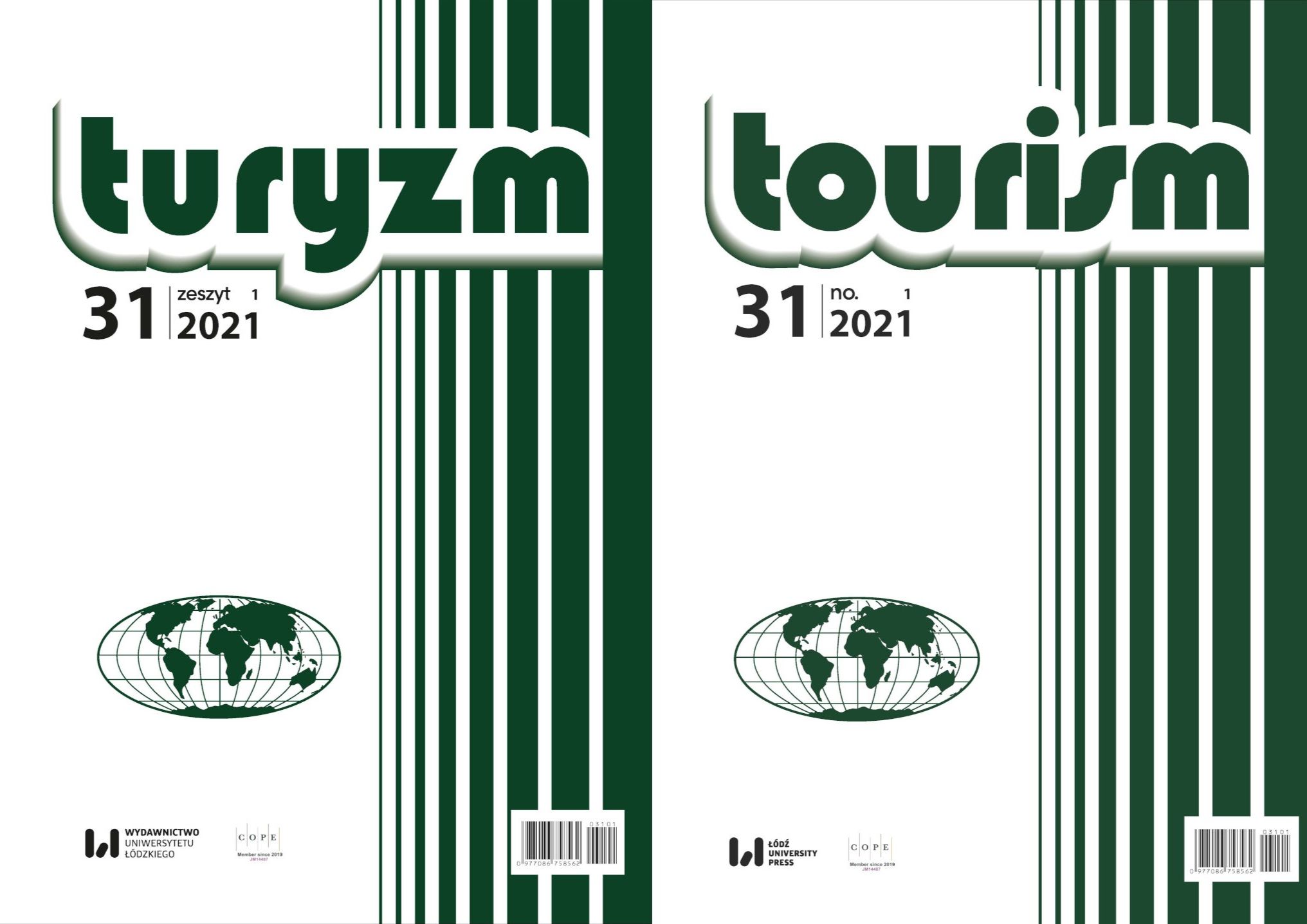Perception of innovation in tourism with regard to controversial types of travel: A study of Polish consumers
DOI:
https://doi.org/10.18778/0867-5856.31.1.19Keywords:
consumer behaviour, innovations in tourism, controversy in tourismAbstract
The aim was to determine how tourism innovations, including controversial types of tourism, are perceived by consumers. The hypothesis adopted was that there would be statistically significant correlations between demographic variables, the respondents’ perception of innovations and their propensity to engage in non-normative behaviour during tourism trips. The study was conducted using the CAWI surveying technique by means of an online questionnaire (N = 407). The respondents had noticed significant changes in the tourism industry and the majority were in favour of those innovations. These mainly related to the development of tourist service infrastructure. The study found a statistically significant difference between male and female respondents with more males in favour of introducing controversial tourism offers to the market. Male respondents were also more likely to engage in deviant behaviour.
Downloads
References
Bhati, A., Pearce, P. (2016). Vandalism and tourism settings: An integrative review. Tourism Management, 57, 91–105. https://doi.org/10.1016/j.tourman.2016.05.005
Google Scholar
DOI: https://doi.org/10.1016/j.tourman.2016.05.005
Dolińska, M. (2010). Innowacje w gospodarce opartej na wiedzy. Warsaw: Polskie Wydawnictwo Ekonomiczne.
Google Scholar
Fodness, D. (1994). Measuring tourist motivation. Annals of Tourism Research, 21 (3), 555–581. https://doi.org/10.1016/0160-7383(94)90120-1
Google Scholar
DOI: https://doi.org/10.1016/0160-7383(94)90120-1
Godlewski, G. (ed.) (2019). Laboratorium doświadczeń turystycznych. Kontrowersje i problemy wokół współczesnej gospodarki turystycznej. Biała Podlaska: Akademia Wychowania Fizycznego Józefa Piłsudskiego w Warszawie. Zamiejscowy Wydział Wychowania Fizycznego w Białej Podlaskiej.
Google Scholar
Goffman, E. (1963). Stigma: Notes on the management of spoiled identity. Englewood Cliffs: Prentice-Hall.
Google Scholar
Goffman, E. (1967). Interaction ritual: Essay on face-to-face behavior. New York: Anchor Books.
Google Scholar
Hirschi, T. (1969). Causes of delinquency. Berkeley: University of California Press.
Google Scholar
Hjalager, A.-M. (2010). A review of innovation in hospitality and tourism. Tourism Management, 31 (1), 1–12. https://doi.org/10.1016/j.tourman.2009.08.012
Google Scholar
DOI: https://doi.org/10.1016/j.tourman.2009.08.012
Hughes, K., Bellis, M.A., Calafat, A., Juan, M., Schnitzer, S., Anderson, Z. (2008). Predictors of violence in young tourists: A comparative study of British, German and Spanish holiday-makers. European Journal of Public Health, 18 (6), 569–574. https://doi.org/10.1093/eurpub/ckn080
Google Scholar
DOI: https://doi.org/10.1093/eurpub/ckn080
Jafari, J. (1987). System turystyki. Społeczno-kulturowe modele do zastosowań teoretycznych. Problemy Turystyki, 3, 7–19.
Google Scholar
Jang, S., Cai, L. (2002). Travel motivations and destination choice: A study of British outbound market. Journal of Travel and Tourism Marketing, 13 (3), 111–133. https://doi.org/10.1300/J073v13n03_06
Google Scholar
DOI: https://doi.org/10.1080/10548400209511570
Januszewska, M. (2008): Proces dyfuzji innowacji w gospodarce turystycznej. In: A. Rapacz (ed.), Gospodarka a środowisko. Innowacyjność w gospodarce (pp. 101–113). Wrocław: Wydawnictwo Uniwersytetu Ekonomicznego we Wrocławiu.
Google Scholar
Juvan, E., Dolnicar, S. (2016). Measuring environmentally sustainable tourist behaviour. Annals of Tourism Research, 59 (C), 30–44. https://10.1016/j.annals.2016.03.006
Google Scholar
DOI: https://doi.org/10.1016/j.annals.2016.03.006
Kerr, J.H., de Kock, H. (2002). Aggression, violence, and the death of a Dutch soccer hooligan: A reversal theory explanation. Aggressive Behavior, 28 (1), 1–10. https://doi.org/10.1002/ab.90001
Google Scholar
DOI: https://doi.org/10.1002/ab.90001
Larsen, J. (2008). De-exoticizing tourist travel: Everyday life and sociality on themove. Leisure Studies, 27 (1), 21–24. https://doi.org/10.1080/02614360701198030
Google Scholar
DOI: https://doi.org/10.1080/02614360701198030
Larsen, J., Urry, J., Axhausen, K. (2007). Networks and tourism: Mobile social life. Annals of Tourism Research, 34 (1), 244–262. https://doi.org/10.1016/j.annals.2006.08.002
Google Scholar
DOI: https://doi.org/10.1016/j.annals.2006.08.002
Lash, S., Urry, J. (1994). Economies of signs and space. London: Sage Publications.
Google Scholar
Li, T. (2015). A research of Chinese deviant behavior and its management. Economic Management, 37 (11), 113–123.
Google Scholar
Łaźniewska, E. (2012). Turystyka w rozwoju lokalnym. Poznań: Uniwersytet Ekonomiczny w Poznaniu.
Google Scholar
MacCannell, D. (1973). Staged authenticity: Arrangements of social space in tourist settings. American Journal of Sociology, 79, 589–603. http://www.jstor.org/stable/2776259 https://doi.org/10.1086/225585
Google Scholar
DOI: https://doi.org/10.1086/225585
MacCannell, D. (1976). The Tourist: A new theory of the leisure class. New York: Schocken Books.
Google Scholar
Maráková, V., Medvedová, M. (2016). Innovation in tourism destinations. Forum Scientiae Oeconomia, 4 (1), 33–43. https://wsb.edu.pl/container/FORUM%20SCIENTIAE/forum%202016%20nr%201/kwartalnik-1-2016-3.pdf
Google Scholar
Marciszewska, B. (2010). Produkt turystyczny a ekonomia doświadczeń. Warsaw: Wydawnictwo C.H. Beck.
Google Scholar
Maufakkir, O., Burns, P.M. (eds) (2012). Controversies in tourism. Oxfordshire: CABI.
Google Scholar
DOI: https://doi.org/10.1079/9781845938130.0000
Munt, I. (1994). The ‘other’ postmodern tourism: Culture, travel and the new middle class. Theory, Culture and Society, 11 (3), 101–123. https://doi.org/10.1177/026327694011003005
Google Scholar
DOI: https://doi.org/10.1177/026327694011003005
OECD, Eurostat (2005). Podręcznik Oslo. Zasady gromadzenia i interpretacji danych dotyczących innowacji. Retrieved from: http://home.agh.edu.pl/~kkulak/lib/exe/fetch.php?media=user:konrad:vary:oslo-manual.pdf (20.10.2020).
Google Scholar
Panasiuk, A. (2015). Miejsce turystyki kontrowersyjnej w strukturze rynku turystycznego. In: G. Godlewski. M. Zalech (ed.), Turystyka kontrowersyjna na współczesnym rynku podróży - formy, uwarunkowania, skutki (pp. 7–21). Biała Podlaska: AWF Józefa Piłsudskiego w Warszawie, Filia w Białej Podlaskiej.
Google Scholar
Panasiuk, A. (2018). Kontrowersyjne obszary rynku turystycznego. Ekonomiczne Problemy Turystyki, 4 (36), 37–47. https://doi.org/10.18276/ept.2018.2.42-04
Google Scholar
DOI: https://doi.org/10.18276/ept.2018.2.42-04
Park, D.-B., Yoon, Y.-S. (2009). Segmentation by motivation in rural tourism: A Korean case study. Tourism Management, 30 (1), 99–108. https://doi.org/10.1016/j.tourman.2008.03.011
Google Scholar
DOI: https://doi.org/10.1016/j.tourman.2008.03.011
Pearce, P., Lee U. (2005). Developing the travel career approach to tourist motivation. Journal of Travel Research, 43 (3), 226–237. https://doi.org/10.1177/0047287504272020
Google Scholar
DOI: https://doi.org/10.1177/0047287504272020
Pechlaner, H., Fischer, E., Hamman, E.M. (2006). Leadership and innovation processes-development of products and services based on core competencies. Journal of Quality Assurance in Hospitality and Tourism, 6 (3), 31–57. https://doi.org/10.1300/J162v06n03_03
Google Scholar
DOI: https://doi.org/10.1300/J162v06n03_03
Pine, B.J., Gilmore, J.H. (1998). Welcome to the experience economy. Boston: Harvard Business Review. https://hbr.org/1998/07/welcome-to-the-experience-economy
Google Scholar
Porter, M.E. (1990). The competitive advantage of nations. New York: Free Press. https://doi.org/10.1007/978-1-349-11336-1
Google Scholar
DOI: https://doi.org/10.1007/978-1-349-11336-1
Ryan, C., Kinder, R.S. (1996). Tourism and sex tourism: Fulfilling similar needs? Tourism Management, 17 (7), 507–518. https://doi.org/10.1016/S0261-5177(96)00068-4
Google Scholar
DOI: https://doi.org/10.1016/S0261-5177(96)00068-4
Samimi, A.J., Sadeghi, Som., Sadeghi, Sor. (2011). Tourism and economic growth in developing countries: P-VAR approach. Middle-East Journal of Scientific Research, 10 (1), 28–32. http://www.idosi.org/mejsr/mejsr10(1)11/5.pdf
Google Scholar
Schumpeter, J.A. (1960). Teoria rozwoju gospodarczego. Warsaw: Państwowe Wydawnictwo Naukowe.
Google Scholar
Scott, N., Laws, E., Prideaux, B. (eds) (2013). Safety and security in tourism: Recovery marketing after crises. New York: Routledge. https://doi.org/10.4324/9781315877372
Google Scholar
DOI: https://doi.org/10.4324/9781315877372
Shields, R. (1992). Places on the margin: Alternative geographies of modernity. London: Routledge.
Google Scholar
Stasiak, A. (2013). Tourist product in experience economy. Turyzm/Tourism, 23 (1), 28–35. https://doi.org/10.2478/tour-2013-0012
Google Scholar
DOI: https://doi.org/10.2478/tour-2013-0003
Stasiak, A. (2015). Turystyka kontrowersyjna jako emanacja gospodarki doświadczeń. In: G. Godlewski, M. Zalech (eds), Turystyka kontrowersyjna na współczesnym rynku podróży – formy, uwarunkowania, skutki (pp. 53–69). Biała Podlaska: AWF Józefa Piłsudskiego w Warszawie, Filia w Białej Podlaskiej.
Google Scholar
Stebbins, R.A. (1996). Tolerable differences: Living with deviance. 2nd edition. Toronto: Routledge.
Google Scholar
Sztabiński, F., Żmijewska-Jędrzejczyk, T. (2012). Mixed mode survey design: problem efektu techniki. Przegląd Socjologiczny, 61 (1), 3–64.
Google Scholar
Teitler-Regev, S., Shahrabani, S., Goziker, O. (2013). The effect of economic crises, epidemics and terrorism on tourism. International Journal of Business Tourism and Applied Sciences, 1 (1), 84–89. http://www.ijbts-journal.com/images/column_1359163804/9%20Sharon.pdf
Google Scholar
Thirumaran, K. (2013). Managing graffiti at tourist attractions. In: Proceedings of the international conference on managing the Asian century (pp. 575–581). Singapore: Springer. https://doi.org/10.1007/978-981-4560-61-0_64
Google Scholar
DOI: https://doi.org/10.1007/978-981-4560-61-0_64
Turner, L., Ash, J. (1975). The golden hordes: International tourism and the pleasure periphery. London: Constable.
Google Scholar
UNWTO (2019). International tourism higlights. Retrieved from: https://www.e-unwto.org/doi/pdf/10.18111/9789284421152 (5.05.2020).
Google Scholar
Uriely, N. (2005). The tourist experience: Conceptual developments. Annals of Tourism Research, 32 (1), 199–216. https://doi.org/10.1016/j.annals.2004.07.008
Google Scholar
DOI: https://doi.org/10.1016/j.annals.2004.07.008
Uriely, N. (2010). ‘Home’ and ‘away’ in VFR tourism. Annals of Tourism Research, 37 (3), 854–857. https://doi.org/10.1016/j.annals.2010.02.006
Google Scholar
DOI: https://doi.org/10.1016/j.annals.2010.02.006
Uriely, N., Belhassen, Y. (2005). Drugs and tourists’ experiences. Journal of Travel Research, 43 (3), 238–246. https://doi.org/10.1177/0047287504272024
Google Scholar
DOI: https://doi.org/10.1177/0047287504272024
Uriely, N., Belhassen, Y. (2006). Drugs and risk-taking in tourism. Annals of Tourism Research, 33 (2), 339–359. https://doi.org/10.1016/j.annals.2005.10.009
Google Scholar
DOI: https://doi.org/10.1016/j.annals.2005.10.009
Uriely, N., Ram, Y., Ayala, M.-P. (2011). Psychoanalytic sociology of deviant tourist behavior. Annals of Tourism Research, 38 (3), 1051–1069. https://doi.org/10.1016/j.annals.2011.01.014
Google Scholar
DOI: https://doi.org/10.1016/j.annals.2011.01.014
Urry, J. (1990). The Tourist Gaze: Leisure and travel in contemporary societies. London: Sage Publications Ltd.
Google Scholar
Wang, N. (2000). Tourism and modernity: A sociological analysis. New York: Emerald.
Google Scholar
Weaver, D.B. (2006). Sustainable tourism: Theory and practice. London: Elsevier Butterworth-Heinemann.
Google Scholar
Weiermair, K. (2004). Product improvement or innovation: What is the key to success in tourism? In: OECD innovation and growth in tourism (pp. 53–69). Paris: OECD Publishing. https://www.oecd.org/cfe/tourism/34267947.pdf
Google Scholar
DOI: https://doi.org/10.1787/9789264025028-5-en
Downloads
Published
How to Cite
Issue
Section
License

This work is licensed under a Creative Commons Attribution-NonCommercial-NoDerivatives 4.0 International License.










